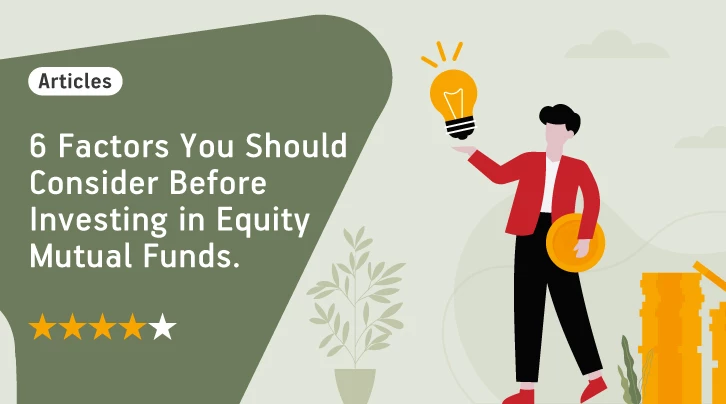-
Our Products
Our FundsFocus Funds
-
Self Care
Self-ServiceFind InformationWays To TransactPartner Solutions
-
Downloads
- Learnings
- About Us
-
More
-
Shareholders
-
Shareholders
-
Updates
-
-
SIP Calculators
- Back
-
Shareholders
6 Factors You Should Consider Before Investing in Equity Mutual Funds

Jun 29, 2023
4 min
4 Rating
Investing in mutual funds is mostly a two-step process. Step one is selecting the fund category, and step two is choosing a scheme in that category. If you've decided to invest in equity funds, you're already done with step one. Now, it's time to start working on step two.
Equity schemes offer one of the highest potential returns compared to other mutual fund categories. However, they can also carry the highest level of risk. Thus, choosing a scheme based on certain factors is essential, enabling you to pick a scheme that best matches your investor profile. Here are 6 such equity fund factors to help you make the decision-
6 Factors for Choosing the Right Equity Mutual Fund
1. Equity Fund Type
To make it easier for investors to choose an equity scheme, SEBI has divided equity mutual funds into 11 categories. They are-
Large Cap Fund
Mid Cap Fund
Small Cap Fund
Large & Mid Cap Fund
Multi Cap Fund
Value Fund Fund
Dividend Yield Fund
Focused Fund
Contra Fund
ELSS
Thematic/Sectoral Fund
Understanding the different types of equity funds is critical to choose a scheme that best matches your investment objectives, time horizon, and risk appetite.-
2. Equity Fund AUM
As the name suggests, Assets Under Management or AUM is the size of the mutual fund scheme. There is no ideal AUM that assures better potential returns. However, if the scheme is too small or too big, it could impact its performance.
You can compare the selected scheme's AUM with the category average to decide. -
3. Scheme TER
Total Expense Ratio or TER is the fund management fee charged by the AMC (Asset Management Company). The TER is directly deducted from the amount you invest. In other words, it directly impacts the returns you generate from your investment.
Thus, it is better to choose a scheme with a lower TER or a TER that is in line with other schemes from the same category. -
4. Exit Load
Most actively managed equity mutual funds also charge an exit load. It is a fee charged by AMCs when investors partially or fully redeem the purchased units within a certain duration.
Before investing in any equity scheme, check its exit load and the lock-in period for which the fee applies. Choose a scheme with a lower exit load and prefer remaining invested throughout the lock-in period, generally up to 1 year.
Also read: Exit Load in Mutual Fund: Meaning, Types, and Calculation -
5. Past Returns
While past returns do not promise future performance, they can offer useful insights into how the fund manager has navigated the scheme through the ups and downs of the equity market. Check the scheme's performance in the last 3-5 years to see if it has delivered consistent returns.
Again, you can also compare the past performance of the scheme with other schemes from the same category to get a better idea. -
6. Growth or IDCW Plan
Another vital consideration before investing in equity funds is selecting between growth and IDCW (Income Distribution cum Capital Withdrawal) plans. Under the growth plan, the returns generated by the scheme are re-invested in the scheme to generate potentially higher returns. With the IDCW plan, the profits (if any) are distributed regularly among the investors.
You can choose the growth plan if your goal is long-term capital appreciation. However, if you aim to generate regular income from your investment, you can choose the IDCW option.
Selecting the Best Equity Mutual Fund for Your Investment
While equity mutual funds can deliver higher potential returns, an equity scheme ideal for one investor might not be the best choice for another investor.
Thus, every investor must focus on their needs, expectations, risk appetite, and objectives to choose the right equity fund for their investment. The factors listed above can help you with this selection.
Mutual Fund investments are subject to market risks, read all scheme related documents carefully.





 1800-270-7000
1800-270-7000



